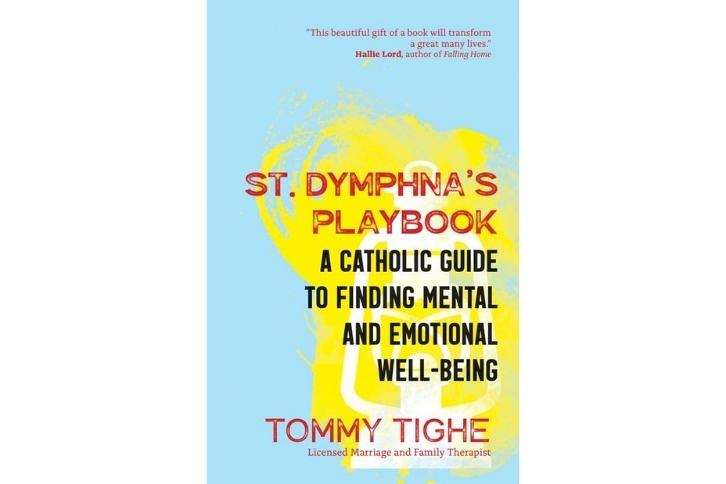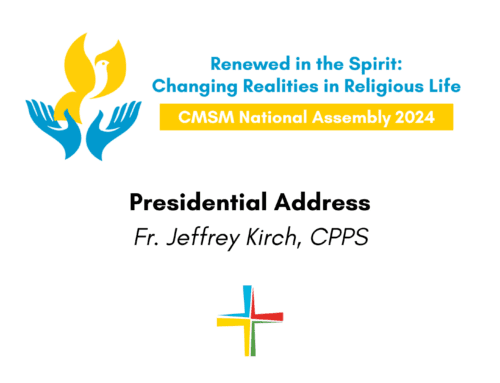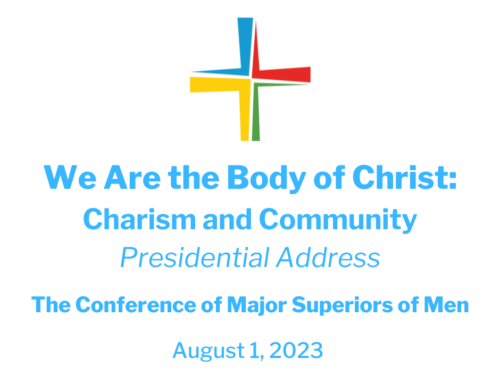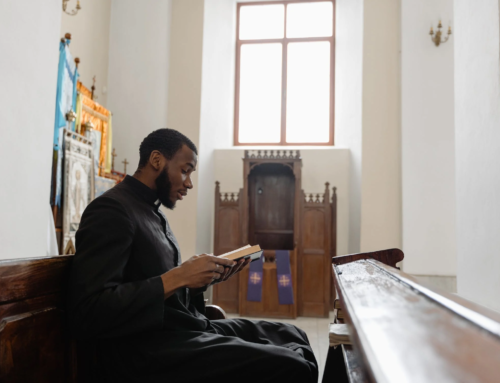By Tommy Tighe. Notre Dame, IN: Ave Maria Press, 2021. Pp. 224; $17.95.
Tommy Tighe’s Saint Dymphna’s Playbook is a compilation of brief essays covering some of the most common mental health concerns in the United States today; depression, anxiety and trauma. The book also addresses aspects of our shared human experience including relationship difficulties and grief. Under the category of depression, the themes of losing joy and pleasure, irritability, fatigue, and hopelessness are covered. When covering anxiety, social anxiety, obsessive-compulsive behaviors, and scrupulosity (a disordered obsession with sin) are addressed. Tighe covers post-traumatic stress disorder, dissociation (feeling disconnected from yourself or reality), self-harm, and loneliness when expanding on the theme of trauma. He also addresses relationship patterns of resentment, feeling stuck in life, manipulation and abusive relationships. Lastly, he discusses the heartbreak, joylessness, and powerlessness of grief, as well as matters of substance abuse that can surface in the experience of grief.
There is wisdom in Tighe’s selection of the major mental health themes of depression, anxiety and trauma. As of 2021, depression and anxiety are in the top three most prevalent mental health diagnoses in the United States;[1] and, trauma is not as rare as we might think. 60% of men and 50% of women experience at least one trauma in their lives, with women having a higher likelihood of experiencing the traumas of sexual assault or child sexual abuse. Men have a higher likelihood of experiencing the traumas of accidents, physical assault, combat, disaster, or witnessing a death or major injury. At this time about 6% of the population in the United States has Post Traumatic Stress Disorder.[2]
There is even greater wisdom in Tighe’s efforts to integrate these common mental health concerns and life experiences with our faith. In each brief essay, after providing an accessible description of the mental health experience and options for help and support, Tighe relates the topic to scripture, the Saints, and provides a prayer for those who may be living with these experiences. In recent years, in the field of mental health, countless research studies have proven that individuals who espouse religious beliefs and align their lives with the practice of a faith have better mental health outcomes than those who do not.[3] Tighe approaches these common mental health concerns and life experiences with a simplicity that can help disarm readers who may be unsure about exploring the benefit of mental health treatment for themselves. In religious life, mental health is emerging as a reality that superiors, formators and members must face as we strive to live the vows and community life in a more flourishing and integrated way.
This book is highly recommended to those who have never received mental health services, are new to exploring the relationship between mental health and our faith, or experience doubt and skepticism due to the field of psychology’s history of anti-faith and anti-God assertions. It could also be a very useful tool for those who experience shame and stigma about mental health struggles and about receiving mental health care. In some cases, people of faith may struggle with trying to stand on one leg, using only spiritual practices to solve concerns that would benefit greatly from the gift of mental health services. Saint Dymphna’s Playbook can provide a way forward. No less than Pope Saint John Paul II once said, “only a Christian anthropology, enriched by the contribution of indisputable scientific data, including that of modern psychology and psychiatry, can offer a complete and thus realistic vision of humans.”[4] Without the field of mental health, deeply integrated into the truths of our Catholic faith, the vision of the human person is not complete, nor is it realistic.
We have reached a time where prevalence rates of mental health concerns are soaring in the United States.[5] We are under the communal strains of a pandemic, the bill coming due on the history of racism in our country, and now world conflict. We no longer have the luxury of failing to encounter Jesus the healer in the counseling room when he asks us to meet him there.
Saint Dymphna’s Playbook attests, finally, to a welcome new development: there is a growing field of Catholic professionals taking mental health seriously. There are ample resources someone interested in finding a Catholic mental health professional, such as https://catholicpsychotherapy.org/ or https://www.catholictherapists.com/, and a directory of Catholic psychiatrists (to help with medication management) can be found at https://www.cathmed.org/ physician-directory.
Works Cited
[1] National Alliance of Mental Health, “3 Most Common Mental Health Disorders in America,” https://www.achn.net/about-access/whats-new/health-resources/3-most-common-mental-health-disorders-in-america/#:~:text=The%20National%20Alliance%20of%20Mental,major%20depression%20and%20bipolar%20disorder.
[2] US Department of Veterans Affairs, National Center for PTSD, “How Common is PTSD in Adults?”, https://www.ptsd.va.gov/understand/common/common_adults.asp.
[3] Maria Archer, “The Positive Effects of Religion on Mental Illness,” Institute for Family Studies, https://ifstudies.org/blog/the-positive-effects-of-religion-on-mental-illness.
[4] Address of His Holiness John Paul II to the Tribunal of the Roman Rota, 10 February 1995, https://www.vatican.va/content/john-paul-ii/en/speeches/1995/february/documents/hf_jp-ii_spe_19950210_roman-rota.html.
[5] Mental Health America, “The State of Mental Health in America 2020 Report,” https://mhanational.org/sites/default/files/2021%20State%20of%20Mental%20Health%20in%20America_0.pdf.






